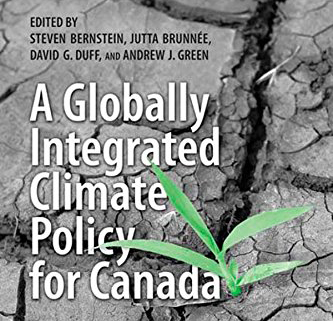Positive Feedbacks, Dynamic Ice Sheets, and the Recarbonization of the Global Fuel Supply: The New Sense of Urgency about Global Warming
A Globally Integrated Climate Policy for Canada, University of Toronto Press
I am delighted to be here to talk about my understanding of the current state of climate science. I should start by saying that I am not trained as a climate scientist, although I have been working in the area and reading the literature for twenty years, since my PHD studies at MIT. I have written articles with climate scientists, and I am deeply interested in the social and technological implications of climate change.
I think I have my finger on the pulse of the climate change community at the moment, and what I’ve noticed in the last several years is a shift in the perspective of leading scientists regarding the seriousness of the climate situation. A few years ago they regarded global warming as a matter of serious concern; now most appear to think that it’s a matter of grave urgency – that we may be literally running out of time. The recent IPCC (Intergovernmental Panel on Climate Change) reports are increasingly viewed as out of date. Leading scientists perceive these reports as underestimating the degree and rapidity of climate change and the severity of its consequences.
We have to keep in mind that — around mid-2005 — the IPCC process brought a guillotine down on the scientific findings that were to be incorporated into the reports. These reports therefore do not reflect almost two years of extraordinarily important findings from multiple streams of scientific research. Indeed, immediately after the Working Group 1 report was released (in February 2007)1, many climate scientists and geophysicists working on ice-sheet dynamics argued that it significantly underestimated potential sea-level rise this century. More recently, we’ve seen much higher carbon dioxide emissions than were anticipated by the IPCC, while the absorptive capacity of ocean and land-based carbon sinks appears to be decreasing more rapidly than anticipated.
Scientists working in this area are principally concerned about three issues: one concerns an underlying mechanism of climate change; another concerns key consequences of climate change; and the final issue concerns the nature of human energy systems. I’ll talk about each of these issues today, and they’re highlighted in the title of my presentation.
The first is destabilizing or ‘positive’ climate feedback. A positive feedback is a causal cycle — essentially a vicious circle — in which warming causes a series of changes that reinforce warming. There are two main kinds of positive feedback: the kind that operates more or less directly on temperature and the kind that operates on the carbon cycle. The feedbacks that operate on temperature are reasonably well incorporated into contemporary climate models. Those that operate on the carbon cycle are not, and it’s becoming increasingly clear that they’re the ones that could literally be deal-breakers for humanity. We may be quite close to creating circumstances in which the biosphere releases enormous quantities of carbon into the atmosphere. At that point, global warming could become its own cause, and it wouldn’t really matter what we do in terms of mitigating our emissions of carbon dioxide – the global ecosystem would take over.
The next issue concerns ice-sheet dynamics: the nature of melting ice sheets, especially the Greenland ice sheet, and the rate at which they’re melting. I’ll talk more about this subject in a minute.
Finally there is the issue of the recarbonization of the global fuel supply. We have recently seen a reversal of a very important trend that had prevailed for about two hundred years – a progressive decarbonization of fuel supplies around the world. This trend meant that we released, over time, less and less carbon into the atmosphere for every unit of energy we produced. In the past five years, that trend has reversed, with potentially staggering implications for climate change.
Now, before going into these issues in more detail, I want to say a little bit about what I think is the decisive defeat of three main arguments that have been introduced over the years by climate skeptics. These are the arguments firstly about long-term temperature change, secondly about satellite data on tropospheric warming, and thirdly about radiation from the sun. I will make only brief remarks about each one of these skeptical arguments, because I think they have been pretty well demolished and shown to be invalid by careful research. The defeat of these arguments has great consequence for the larger debate about the policy implications of climate change.
1 Contribution of Working Group I to the Fourth Assessment Report of the IPCC, Climate Change 2007 – The Physical Basis of Climate Change (2007) online, http://ipcc-wgl.ucar.edu/wg1/wg1-report.html

Topics
Climate Change
Energy
Environmental Stress and Conflict
